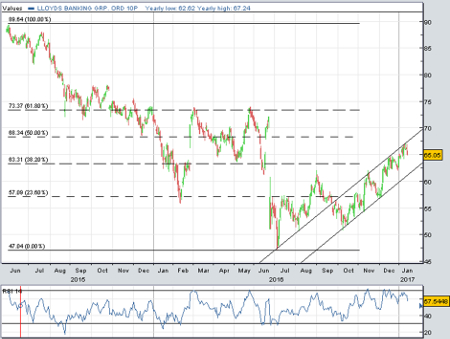Lloyds price target upgraded by 17%
16th January 2017 13:23
Is near-£2 billion takeover of MBNA worth the equivalent of a 2.5p per share special dividend? Only time will tell but, after factoring in the acquired credit card business, one City number cruncher has made double-digit upgrades to earnings forecasts and spelled out what's needed for a second leg of this recovery story.
It's been nearly a decade, but Lloyds continues to feel the pressure from the financial crisis and miss-selling scandals. The bank is in much better shape, however, and the banking sector is widely tipped to do better in 2017. One analyst announced a big upgrade this year already, now a second has adjusted its numbers higher.
Buying MBNA from for £1.9 billion is great for earnings and margin growth, says Deutsche Bank analyst David Lock. Increasing its share of the credit card market from 15% to 26%, Lloyds gets £7 billion of gross assets and £650 million of annual revenue from the acquisition, which also compliments Lloyds' hard graft for lower costs.
Increasing adjusted earnings per share (EPS) forecasts by 5-12% for 2017-19, Deutsche reckons Lloyds will make EPS of 6.67p, 6.02p and 5.99p in 2017/18/19, from underlying pre-tax profit of £7.58 billion, £6.95 billion and £6.93 million.

Include its simplification programme and non-branch property disposal programme - targeting £1.4 billion and £200 million of savings respectively - and Lloyds is clearly keen to shed costs. By the end of 2018, the bank should have made £0.8 billion of run rate savings and £100 million from one-off cost-cutting.
But it costs to save, and Lock is expecting £1 billion of charges to come through in the run up to 2018 - £600 for restructuring, £200 million for ring fencing and £200 million for MBNA as it consolidates its IT, marketing and property.
These plans are likely to be given a re-write over the next year, either at the 2016 full-year results or at the 2017 interims/when the MBNA deal closes. "We expect further cost initiatives to be evolutionary rather than revolutionary," explains the analyst.
Is it all worth it?
While it will be hard for this purchase to go wrong, Lock wonders whether the deal is worth the equivalent of a 2.5p per share special dividend. As long as the impairment cycle remains healthy, this dividend capacity should be recovered over five years.
"Impairments would have to be at peak-crisis-levels of write-offs in order for the book to be lossmaking/dilutive for the group," writes Lock.
"However, whether the transaction was worth the 80 basis points (bps) capital cost (equivalent to c.2.5p of special dividend) will only be judged in coming years: it will take circa 5 years for the EPS accrual on the transaction to compensate the capital cost at expected return on investment, but longer if impairments are higher than expected."
Lock, who still rates Lloyds a 'hold', has upgraded his price target from 58p to 68pTrading on just under 11 times 2018 earnings and around 1.2x tangible net asset value, Lloyds is priced at a premium to its European benchmark, although Lock thinks this is justified given its returns, business model and dividend yield of 5-7%.
Jumping 30% to 65p since early October, Lloyds has smashed through layers of technical resistance to its post-financial crisis highs.
Lock, who still rates Lloyds as just a 'hold', has upgraded his share price target from 58p to 68p, which would mark the half-way point in a recovery from a post-Brexit vote low of 47p to 2015 high at around 90p.
"To see greater upside, we think we would need to see sustainably lower-for-longer impairments in the outer years (our current forecasts envisage circa 40bps in 2018/19 versus 15bps today and pre-crisis average of circa 65bps), a material upgrade to cost plan, and/or better than expected margin outlook for the UK."
This article is for information and discussion purposes only and does not form a recommendation to invest or otherwise. The value of an investment may fall. The investments referred to in this article may not be suitable for all investors, and if in doubt, an investor should seek advice from a qualified investment adviser.
Editor's Picks